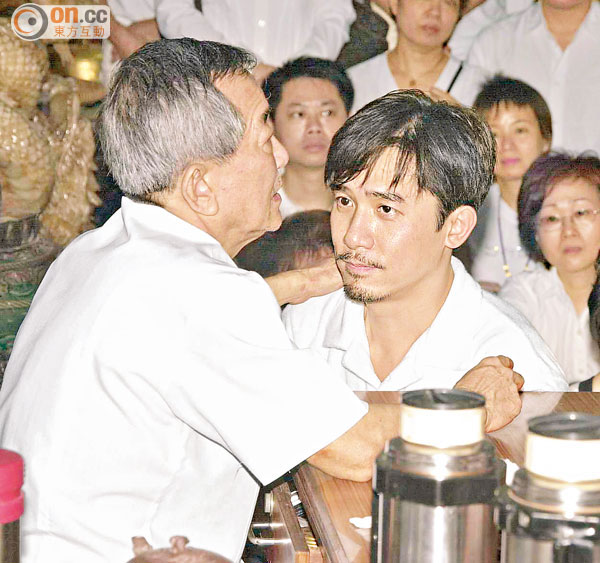Magical mystery man
He plays guru to celebrities and showbiz honchos, but who exactly is the Thai master they call White Dragon King?
By Foong Woei Wan
Straits Times, March 11, 2007

WHEN Martin Scorsese scored a Best Director Oscar last month for The Departed, an American remake of Infernal Affairs, he thanked Andrew Lau, the director of the Hong Kong film.
For days, Lau, his team and the Hong Kong movie industry basked in the reflected glory of the win.
Then Lau and his investor, Peter Lam, made their way to Pattaya, Thailand, to give thanks to their guru, a Chinese Thai man whom disciples call the White Dragon King.
The Hong Kong group – including friends like entertainers Richie Jen and Nat Chan – prayed at the self-styled prophet’s temple on March 3.
Like about 700 other devotees who thronged the temple that day, the celebrities wore white, walked around barefooted and waited in line to greet the guru. The next morning, the group and other disciples – by now a crowd of 1,000 – showed up at the temple again for an annual good luck ceremony.
‘I come here every year if I’m free,’ Lau told Apple Daily. ‘I can’t say what the White Dragon King’s instructions to me were, of course.’
The guru is much revered, and not just by Hong Kong celebrities, but much about his life is shrouded in mystery.
The White Dragon King began life as Chau Yun Nam and speaks Thai, Teochew and Mandarin. This much, at least, is known from Hong Kong reports.
But what he did in his early years, how he became a guru and even his age are the stuff of modern myth. Various versions of his story have been printed in Hong Kong and China.
Chau, 66 or 69, was most likely an electrical appliances or bicyle repairman, though some say he was a salesman.
More than 20 years ago, he either communicated with a white dragon deity or somehow began to believe that he was its reincarnation. In any case, he gave up his job and became a spiritual guide.
According to Hong Kong’s Next Magazine tabloid, he once turned away a group of tattooed men and tawdrily dressed women. Thereafter, to avoid offending him, his disciples decided to be decked in pristine white clothes whenever they called on him.
For about 18 years, the guru has played career consultant to Hong Kong celebrities. The region’s biggest names – Jackie Chan, Andy Lau and Tony Leung Chiu Wai – have gone on pilgrimages to meet the King. Others like Eric Tsang, Alan Tam, Rosamund Kwan, Shu Qi, Stephen Fung and Daniel Chan are known to throng the temple, too.
Tourists have followed in their footsteps, including some from Singapore.
All this has helped make the White Dragon King’s spacious temple an attraction like Bangkok’s Erawan Shrine, which houses the famous four-faced statue of Hindu deity Brahma.
LifeStyle zooms in on advice the guru has given and predictions he has made:
Before Leung became the toast of Chinese cinema, Chau reportedly foretold that he would be named Best Actor for the 1994 romance Chungking Express.
Leung won the Golden Horse and Hong Kong Film awards for the film in 1994 and 1995 respectively and has been a devout believer in Chau since, said the Sudden Weekly tabloid.
However, Leung has been visiting Chau without his girlfriend, actress Carina Lau. The guru has declined to meet her in recent years, saying they are not destined to know each other.
Media Asia chairman Lam, a long-time devotee of Chau, invited the guru to Hong Kong in 2002 to preside over a prayer ceremony for the filming of Infernal Affairs.
It was Chau’s first such visit to Hong Kong, and he caused a stir at the ceremony when he handed out fruits and hongbao of HK$100 each to the cast as well as reporters.
On Chau’s advice, Lam changed the crime drama’s four-word Chinese title, Wu Jian Xing Zhe (Continuous Traveller), to three characters: Wu Jian Dao (Continuous Hell).
The film made a killing at the box office, with HK$60 million in Hong Kong and S$1.2 million in Singapore.
So for the movie’s two sequels in 2003, Lam flew Chau to Hong Kong for the prayer ceremonies and premieres, too. For the record, both films were hits.
Hong Kongers had a scare when Chau reportedly predicted that ‘something bad’ would happen in the territory on the night of Feb 8, 2005.
He later told journalists that his advice was intended for only one of his Hong Kong believers, not everyone.
http://forums.hardwarezone.com.sg/showthread.php?t=1761716































